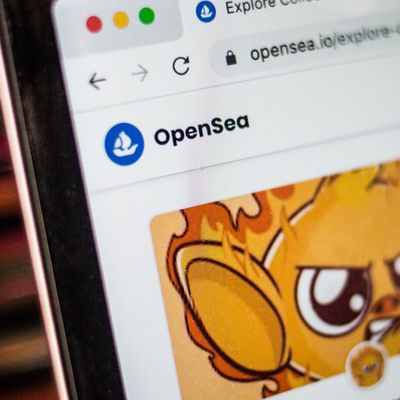
The world of NFTs, which exploded last year amid a pandemic-induced cryptomania, notched a fun new milestone today: its first insider-trading indictment.
On Wednesday, the Department of Justice charged Nathaniel Chastain, a former Harvard poetry student and Mad Magazine jokester, with a single charge each of wire fraud and money laundering for allegedly front-running the crypto markets by buying up 45 NFTs and then selling them shortly after for at least double the money — and sometimes five times as much, according to the indictment. He was arrested this morning in New York and faces up to 40 years in prison for allegedly abusing his position at OpenSea, the Andreessen Horowitz–backed platform for buying and selling so-called non-fungible tokens.
The nature of the whole scheme is very particular to the world of crypto last summer. For those who have learned to tune out when anyone utters the word “blockchain,” NFTs are digital assets that can’t be copied endlessly, giving the holder rights of ownership — often to an original image or piece of art. At the time of Chastain’s alleged profiteering, the crypto assets were about to reach a peak in sales, propelled by the popularity of collections of cartoonish doodles, including the now-famous Bored Ape Yacht Club. Some are worth millions. The problem with NFTs was that, like many other kind of art, their value was in large part determined by their popularity, with most of them being functionally worthless.
Chastain didn’t create NFTs. He was an enthusiast who adopted the persona of his blue-haired pirate NFT Twitter avatar online. More importantly, though, he was product manager for OpenSea and in particular was responsible for overseeing the homepage for the popular NFT marketplace. In that job, he selected which of the NFTs would be featured on the homepage, essentially choosing what would get the biggest audience. “Chastain also knew that the value of an NFT typically rose after it became a featured NFT,” according to the indictment. What Chastain allegedly did, from June to September last year, was set up anonymous digital wallets, buy up NFTs before they hit the homepage — at a time when they would be cheaper — and then sell them soon after for a tidy profit. Some NFTs detailed in the indictment now show his purchase history.
The whole thing was discovered last September by a crypto personality who goes by 0xZuwu on Twitter. The NFT investor was able to trace the sales back to Chastain and posted about it all online. Soon Chastain lost his job, and OpenSea confirmed that the secret buying and selling ahead of the homepage marketing push had happened. Chastain never responded to comments, and his Twitter page went silent.
After the Justice Department filed the indictment, crypto Twitter has been stirred up about the prospect that they could have to play by the same rules as the rest of the world. The Justice Department is alleging that his knowledge of what was going to be marketed and when counts as confidential information and that trading on that knowledge is an abuse of the integrity of the markets. For years, the industry has been able to shape-shift around new fads as federal regulators continue to hammer out the basic definitions of cryptocurrencies and whether digital assets should be policed like the stock or commodities markets. But that might be coming to an end. It has been a rough year for the industry, what with weirdo rappers getting accused of money laundering and people losing their life savings in spectacular collapses. Chastain risks being the face of a new frontier in crypto fraud.






























